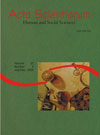<b>A morte no pensamento de Lúcio Aneu Sêneca</b> - DOI: 10.4025/actascihumansoc.v28i1.183
Resumen
O presente trabalho tem como preocupação fazer algumas reflexões sobre o pensamento de Lúcio Aneu Sêneca, político e pensador do s éculo I da era cristã, no que se refere à morte, natural ou provocada por suicídio, que é apresentada pelo pensador latino como parte integrante do conteúdo para a formação do homem ideal, o sábio. Sêneca entende que a morte é um dos deveres da existência, cabendo ao homem ideal, o sábio, ser formado no sentido de tomar consciência dessa condição e, por extensão, romper com o medo por ela despertado, o que se expressa em recorrer ao suicídio quando isto se fizer necessário para preservar a dignidade da pess oa humana. Assim, cabe à filosofia afastar do homem o medo e angústia diante da morte.Descargas
DECLARAÇÃO DE ORIGINALIDADE E DIREITOS AUTORAIS
Declaro que o presente artigo é original, não tendo sido submetido à publicação em qualquer outro periódico nacional ou internacional, quer seja em parte ou em sua totalidade.
Os direitos autorais pertencem exclusivamente aos autores. Os direitos de licenciamento utilizados pelo periódico é a licença Creative Commons Attribution 4.0 (CC BY 4.0): são permitidos o acompartilhamento (cópia e distribuição do material em qualqer meio ou formato) e adaptação (remix, transformação e criação de material a partir do conteúdo assim licenciado para quaisquer fins, inclusive comerciais.
Recomenda-se a leitura desse link para maiores informações sobre o tema: fornecimento de créditos e referências de forma correta, entre outros detalhes cruciais para uso adequado do material licenciado.


























